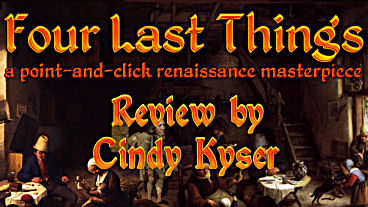
Four Last Things Review
Four Last Things is escapism at its best and not a statement of theology







Genre: Point-and-Click Adventure
Release date: February 23, 2017
In Christian theology, the phrase “Four Last Things” refers to the last stages of the soul in life and in the afterlife. These are Death, Judgment, Heaven, and Hell. Christian tradition also identifies the Seven Deadly Sins of envy, gluttony, greed, lust, pride, sloth, and wrath. These are transgressions that are considered fatal to spiritual progress. In 1500, Hieronymus Bosch combined these concepts in his painting with the (wildly creative) title of The Seven Deadly Sins and the Four Last Things.
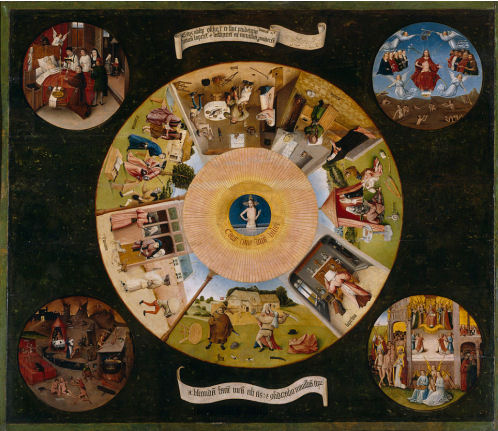
In 2017, Joe Richardson recombines these concepts into a delightful adventure game, Four Last Things, using work gathered from famous Renaissance artists and musicians with all sources documented in the game’s credits. He creates a very interesting and immersive experience that reminds me most of Monty Python.
The game begins with a wonderfully irreverent montage of Creation and the Original Sin (that is, Adam eating the apple). It then fast-forwards to our traveler -– a guy wandering the landscape looking for a church so that he can make his confessions. In the true spirit of religious bureaucracy, the local priests do not grant absolutions for sins committed outside their district. Their advice to our traveler is to go and recommit his sins within district boundaries; only then will they hear his confession.
Thus, our traveler begins to explore the area on the lookout for opportunities to commit each of the Seven Deadly Sins. For most sins, an elaborate chain of events must be set up and items located to “qualify.” Each success is rewarded by a congratulatory announcement that “YOU HAVE SINNED.” Once the goal of all seven sins is achieved, our traveler returns to the church and proceeds through the remaining Last Things.
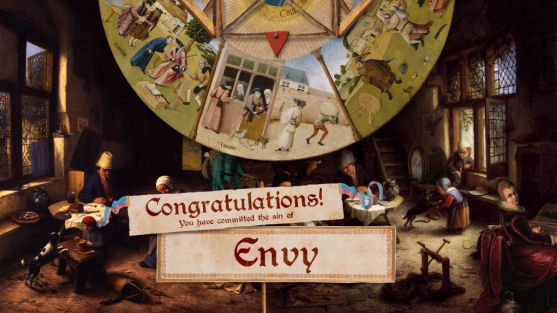
All graphics in Four Last Things are created as detailed collages of art clipped from famous paintings, with animation. Birds fly, animals and people move, and lips flap during dialog. This results in a splendid and varied landscape of scenery, town, and characters. The entire soundtrack is composed of snippets of classical musical that set the mood for each scene. There are some sound effects but no voiceovers. Dialog is displayed on-screen as text, and conversations are executed by selecting from a list of options and then clicking through the responses.
You interact with the game environment by clicking on the screen. Active spots display a group of icons that represent actions that can be taken (examine, take, talk, etc.). Inventory is displayed by moving your cursor to the top of the screen, and items are used by dragging and dropping.
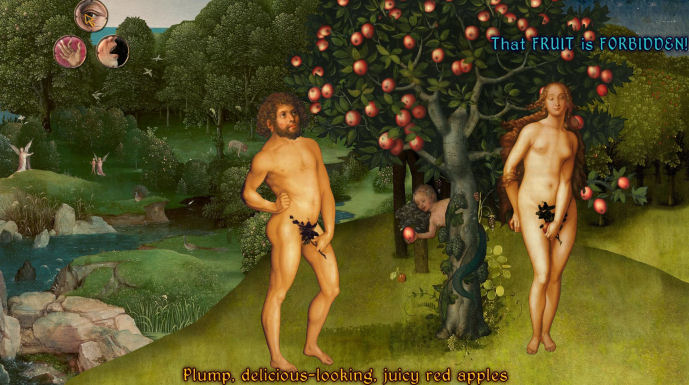
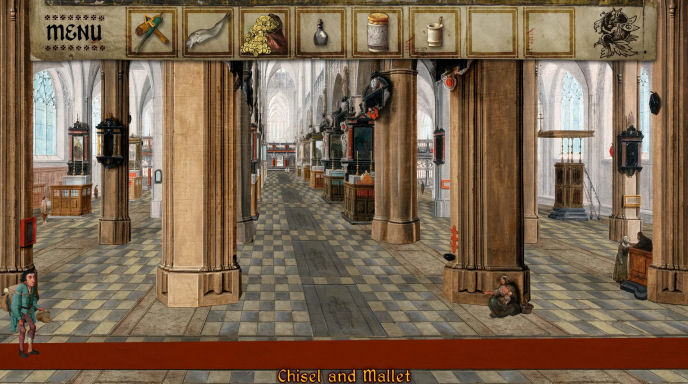
Your progress is auto-saved into a single slot and there are no game settings to tweak. It is an intuitive interface that requires no learning curve. For those with a quick wit and an appreciation of tongue-in-cheek humor, this is a must-play. The dialog will make you smile and luckily, there is no attempt by this developer to be politically correct.
I love this game but should note that Four Last Things is a somewhat short adventure. I played it through in under 3 hours, with more than a third of that time trying to commit the sin of Gluttony. The first sin was simple to commit and this lulled me into thinking it was an easy game. In truth, it is an exercise that requires creative problem-solving using obscure clues and objects at hand. I admit that my normal day does not involve scheming on how to best approach the challenge of sinning! My advice to those who play is that, when stuck, they just move on to the next sin, and more will be revealed.
I admit that I was not thrilled with the outcome of this game, as I am not a fan of predestination. If there is an alternate ending, I did not discover it by playing through the final sequence many times. But at the end of the day, Four Last Things is escapism at its best and not a statement of theology.
|
+ Unique and luxurious game world achieved with familiar art and music
+ Sinning is a challenging business that will stimulate the brain
– For clever gamers, this will be a short adventure
– Despite your best efforts, redemption may be elusive
|
 |
System Requirements
Processor: 2 GHz – dual-core
Memory: 2 GB RAM
Graphics: OpenGL 2.0 compatible with 512 MB RAM
Storage: 500 MB available space
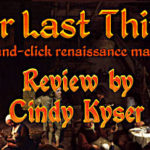
Leave a Reply